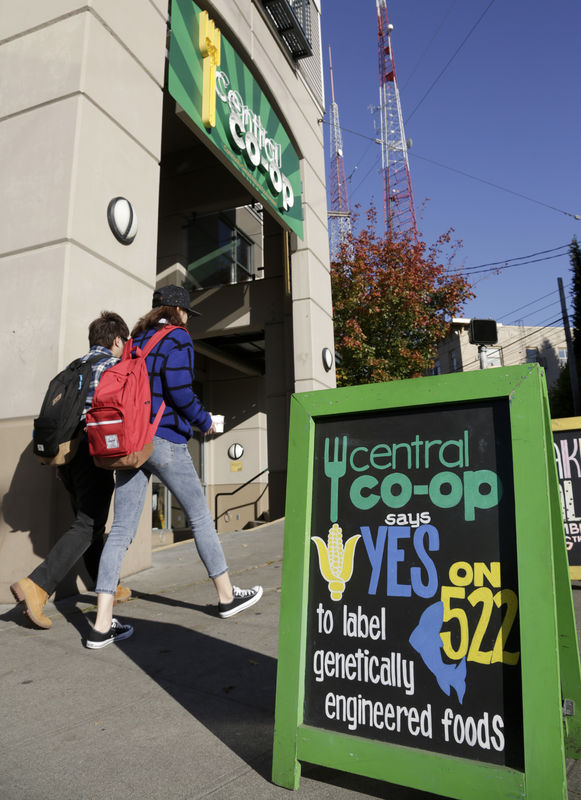 © Reuters. People walk past a sign supporting a ballot initiative in Washington state that would require labeling of foods containing genetically modified crops at the Central Co-op in Seattle, Washington
© Reuters. People walk past a sign supporting a ballot initiative in Washington state that would require labeling of foods containing genetically modified crops at the Central Co-op in Seattle, WashingtonWASHINGTON (Reuters) – The U.S. Department of Agriculture on Thursday laid out its first-ever requirements for labeling of genetically engineered, or GMO, foods as early as 2020, a rule met with praise from some farmers and criticism from consumer groups.
Consumers have been pushing for years for greater transparency over what is in their food, fighting pushback from farmers who fear the labeling would curb demand for genetically engineered ingredients and food companies which said the label changes would be costly and confusing.
The long-awaited details released on Thursday by the USDA came more than two years after lawmakers agreed on the requirements. The agency has been reviewing feedback from farmers, food companies and consumers who filed comments earlier this year.
“This ensures clear information and labeling consistency for consumers about the ingredients in their food,” Agriculture Secretary Sonny Perdue said in a statement. “The standard also avoids a patchwork state-by-state system that could be confusing to consumers.”
GMO crops have had their genes altered using biotechnology.
The new requirements will provide some consistency and a clear plan for food companies that now need to overhaul their labels.
But consumer groups criticized the USDA for saying companies need to use the term “bioengineered” rather than the more commonly used terms “genetically engineered” or “GMO.”
“The USDA has betrayed the public trust by denying Americans the right to know how their food is produced,” said Andrew Kimbrell, executive director at the Center for Food Safety.
The USDA also excluded some highly processed ingredients like sugar from beet and soyoil from mandatory labeling. That is a win for farmers of some crops, including sugar beet, who feared being labeled as GMO would reduce consumer demand for their products.
“We believe that it allows transparency for consumers while following the intent of Congress that only food that contains modified genetic material be required to be labeled bioengineered under the law, with food companies having the option of providing additional information if they choose,” said Davie Stephens, a soybean grower from Kentucky and president of the American Soybean Association.
Fusion Media or anyone involved with Fusion Media will not accept any liability for loss or damage as a result of reliance on the information including data, quotes, charts and buy/sell signals contained within this website. Please be fully informed regarding the risks and costs associated with trading the financial markets, it is one of the riskiest investment forms possible.
Source: Investing.com



























